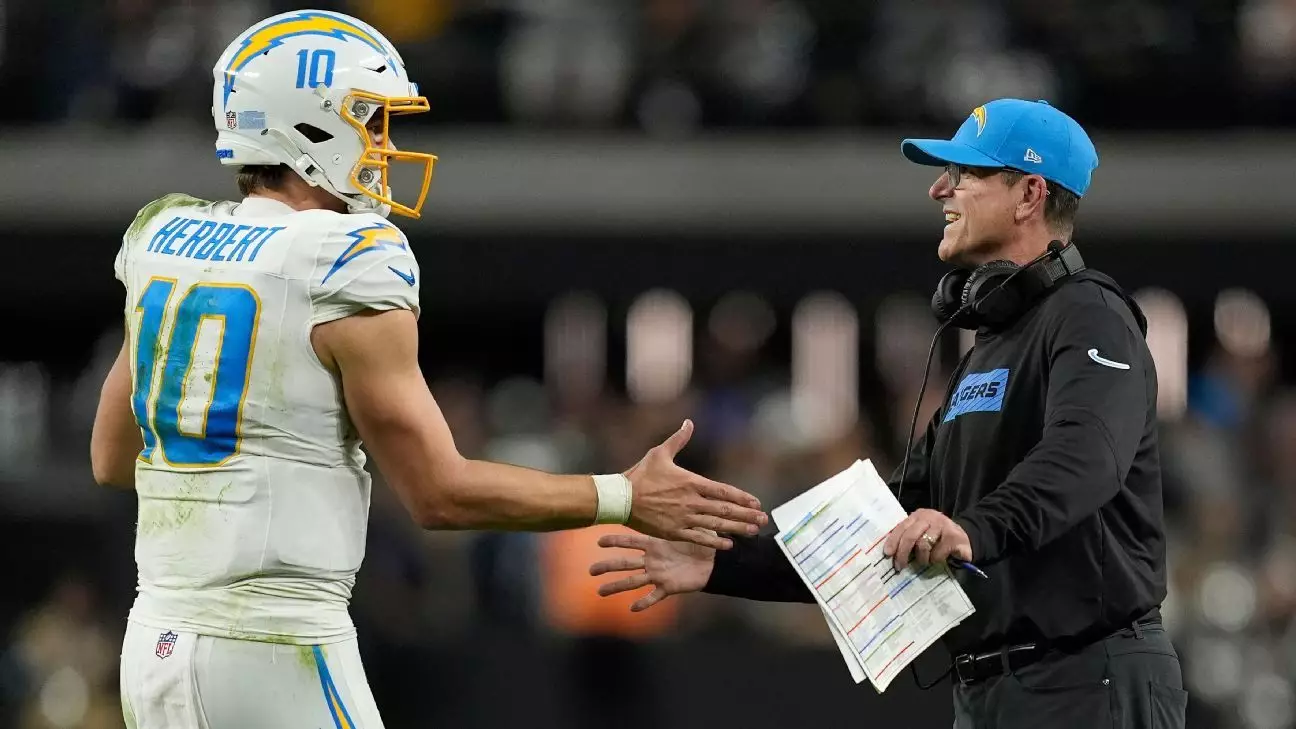The immense pressure of playoff performance is an aspect that distinguishes great quarterbacks from good ones, and for the Los Angeles Chargers’ Justin Herbert, that pressure culminated in a devastating 32-12 defeat against the Houston Texans. Despite arriving at the playoff stage with an impressive regular season performance, including boasting the league’s fewest interceptions, Herbert’s performance shattered expectations, casting shadows over his potential and leadership.
Herbert entered the game with a stellar reputation, having managed only three interceptions throughout the entire regular season. However, the playoff atmosphere and perhaps the weight of expectations undeniably impacted his decision-making. The game against the Texans was typified by critical errors, beginning with a poorly executed play-action pass that was intercepted due to an underthrow. His initial missteps, particularly an interception thrown across his body while attempting to connect with rookie wide receiver Quentin Johnston, signaled a breakdown in fundamentals that is unusual for a player of Herbert’s caliber.
The game continued to spiral as Herbert tallied further interceptions, including a pick-six that underscored the pressure mounting on him. By game’s end, his completion percentage hovered at an alarming 43.8%, marking the worst performance in a playoff context for a Chargers quarterback since Philip Rivers. Such statistics are not just numbers; they recount a story of a player who despite clear talent, faltered in the critical moments, raising questions about his clutch ability under pressure.
While statistics can paint a vivid picture of Herbert’s struggles, the role of coaching must also be scrutinized. Head Coach Jim Harbaugh openly acknowledged a failure in the game plan, suggesting that the team did not adequately prepare Herbert to succeed against the Texans’ aggressive pass rush. This acknowledgment raises significant questions about the effectiveness of the coaching staff and their ability to adapt the game plan for playoff intensity.
Despite the criticisms aimed at Herbert, Harbaugh’s sentiments reflect a broader understanding that a quarterback’s performance is quintessentially linked to the support they receive from their coaching and offensive line. Herbert faced unrelenting pressure, being hurried on 50% of his dropbacks and suffering direct hits that impeded his usual rhythm. The recognition of these factors reflects a nuanced understanding of the complexities involved in high-stakes games.
Herbert’s struggles aren’t isolated to this one playoff appearance. Following a troubling loss the previous season against the Jacksonville Jaguars—characterized by a historic collapse—questions surrounding his mental resilience and ability to lead under duress loom large. The narrative surrounding Herbert now becomes doubly critical as analysts and fans scrutinize his playoff performances: a recurring theme of coming up short when it truly matters.
General Manager Joe Hortiz has defended his quarterback, drawing parallels to other elite quarterbacks such as Peyton Manning and Lamar Jackson, who also faced early playoff disappointments. This perspective encourages a broader understanding of the learning curve for young quarterbacks at the NFL level. While comparisons can be helpful, they can also unintentionally heighten the expectations placed on Herbert, constantly drawing attention to the urgency of improvement.
For Herbert, the road ahead will require introspection and resilience. A player of his talent has the ability to recover from such setbacks, but it demands a strong work ethic and a supportive infrastructure to foster growth. His admission of letting down the team shows maturity and accountability, traits that can serve him well in his quest for postseason success.
The narrative surrounding his playoff performances may cast shadows on his current standing, but it is equally important to recognize the growth opportunities that lie ahead. As the Chargers evaluate their trajectory, focusing on strengthening the supporting cast—with a particular emphasis on offensive line protection and strategic adaptability—will be crucial for Herbert’s success in future seasons.
While Herbert’s playoff struggles have opened a dialogue about his capabilities, it is equally essential to observe the surrounding dynamics that impact on-field performance. As champions are often forged in the fires of adversity, how Herbert responds to these trials may ultimately define his legacy in the NFL.

